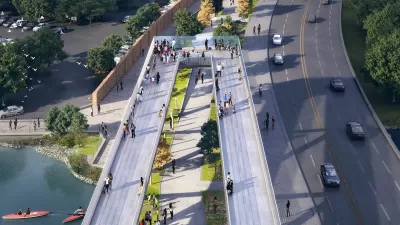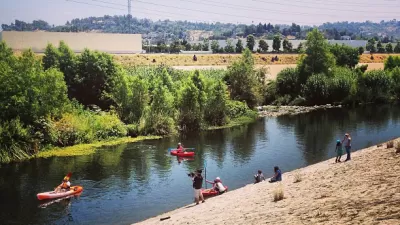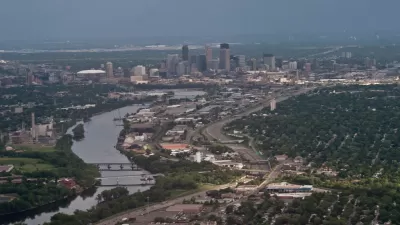Jon Christensen urges Los Angeles to ensure that new park amenities serve, rather than displace, the river's low-income communities.

As Los Angeles solicits public input on a park considered a key piece of the L.A. River revitalization, Jon Christensen ponders whether the city can achieve an "equitable and just greening." In a piece for CityLab, he offers more questions than answers about how to ensure the future of the low-income communities surrounding the river project.
While green spaces and parks yield important benefits to those with access to them, "improved parks, like other positive amenities—cool retail, coffee shops, fresh produce—are correlated with gentrification, in some cases," he writes.
That's a problem that Los Angeles will have to contend with as the promise of a naturalized river attracts real-estate investment that could threaten existing residents. Recently, the core community group Friends of the Los Angeles River (FOLAR)—whose decades of advocacy helped mainstream the revitalization effort—opposed a major housing development on the waterfront that didn’t include enough affordable units.
Last year, FOLAR published a guide to riverfront development focused on equity and affordability. Still, Christensen laments:
"Right now, we don’t have any really good models for inclusive green development that can lift up communities in place while providing the access to nature, open space, and recreational opportunities that we know are so important to the health of people and their neighborhoods."
FULL STORY: Can the L.A. River Avoid 'Green Gentrification'?

Planetizen Federal Action Tracker
A weekly monitor of how Trump’s orders and actions are impacting planners and planning in America.

Map: Where Senate Republicans Want to Sell Your Public Lands
For public land advocates, the Senate Republicans’ proposal to sell millions of acres of public land in the West is “the biggest fight of their careers.”

Restaurant Patios Were a Pandemic Win — Why Were They so Hard to Keep?
Social distancing requirements and changes in travel patterns prompted cities to pilot new uses for street and sidewalk space. Then it got complicated.

Platform Pilsner: Vancouver Transit Agency Releases... a Beer?
TransLink will receive a portion of every sale of the four-pack.

Toronto Weighs Cheaper Transit, Parking Hikes for Major Events
Special event rates would take effect during large festivals, sports games and concerts to ‘discourage driving, manage congestion and free up space for transit.”

Berlin to Consider Car-Free Zone Larger Than Manhattan
The area bound by the 22-mile Ringbahn would still allow 12 uses of a private automobile per year per person, and several other exemptions.
Urban Design for Planners 1: Software Tools
This six-course series explores essential urban design concepts using open source software and equips planners with the tools they need to participate fully in the urban design process.
Planning for Universal Design
Learn the tools for implementing Universal Design in planning regulations.
Heyer Gruel & Associates PA
JM Goldson LLC
Custer County Colorado
City of Camden Redevelopment Agency
City of Astoria
Transportation Research & Education Center (TREC) at Portland State University
Camden Redevelopment Agency
City of Claremont
Municipality of Princeton (NJ)





























